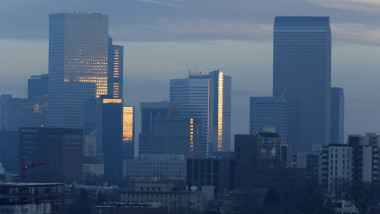Environmental Protection Agency delays new ozone pollution standards until after the 2024 election
The Environmental Protection Agency is delaying plans to tighten air quality standards for smog despite a recommendation by a scientific advisory panel to lower air pollution limits to protect public health.
The decision by EPA Administrator Michael Regan means that one of the agency’s most important air quality regulations will not be updated until well after the 2024 presidential election.
“I have decided that the best path forward is to initiate a new statutory review of the ozone (standard) and the underlying air quality criteria,’' Regan wrote in a letter to the EPA advisory panel last month. The letter cites “several issues” raised by the panel in a recent report that “warrant additional evaluation and review.’'
The review, which will last at least two years, will “ensure that air quality standards reflect the latest science in order to best protect people from pollution,’' Regan said.
Regan’s decision avoids an election year battle with industry groups and Republicans who have complained about what they consider overly intrusive EPA rules on power plants, refineries, automobiles and other polluters.
The delay marks the second time in 12 years that a Democratic administration has put off a new ozone standard prior to an election year. President Barack Obama shut down plans to tighten ozone standards in 2011, leading to a four-year delay before the standards were updated in 2015.
Paul Billings, senior vice president of the American Lung Association, called the EPA’s decision “profoundly disappointing” and a missed opportunity to protect public health and promote environmental justice. A recent report by the lung association showed that minority communities bear a disproportionate burden from ground-level ozone, which occurs when air pollution from cars, power plants and other sources mixes with sunlight. The problem is particularly acute in urban areas.
Billings called the ozone rule “the public health cornerstone of the Clean Air Act,’' adding that “millions of people will breathe dirty air for many more years’’ as a result of the delay. An increased number of asthma attacks, sick days and even premature death are likely to occur, he and other public health advocates said.
Raul Garcia, vice president of policy and legislation for Earthjustice, called the delay “shameful” and unjustified. “The science tells us we are long overdue,” Garcia said.
Democratic lawmakers also were disappointed. “Inaction threatens public health and puts those with underlying conditions such as asthma or lung disease at an elevated risk,’' said Rhode Island Sen. Sheldon Whitehouse. He and 51 other Democrats had urged swift action on a new rule.
“Unfortunately we’ve seen the process for updating the ozone standards repeatedly swept up in political games that risk lives,’' the lawmakers said in an Aug. 7 letter to the EPA.
Conor Bernstein, a spokesman for the National Mining Association, applauded the EPA’s decision “not to race ahead with an unnecessary revision of the ozone standards,’' which have not been changed since 2015. The current standard was reaffirmed in December 2020 under then-President Donald Trump, a Republican.
Bernstein, whose members produce coal and other fossil fuels, urged officials to reconsider other regulations that he said target coal-fired power plants and endanger reliability of the electric grid. “It’s clear — and deeply alarming — that EPA (does not) understand the cumulative impact its rules will have on the grid and the nation’s severely stressed power supply,’' he said.
A spokeswoman for the American Petroleum Institute, the top lobbying group for the oil and gas industry, said current ozone limits are among the most stringent in the world. “Any tightening of the standard could impact energy costs, threaten U.S. energy security and impact businesses and American consumers,’' spokeswoman Andrea Woods said in an email.
The EPA’s decision comes after two advisory panels — the EPA’s Clean Air Scientific Advisory Committee and the White House Environmental Justice Advisory Council — urged the agency to lower the current ozone standard of 70 parts per billion.
“Based on the scientific evidence currently available, it is concluded that the level of the current standard is not protective with an adequate margin of safety,’' the EPA panel said in a June report. A limit of 55 to 60 parts per billion “is more likely to be protective and to provide an adequate margin of safety,’' the panel said.
Lianne Sheppard, a University of Washington biostatistics professor who chairs the scientific advisory panel, said Regan’s decision was “his alone” to make.
“However, I am disappointed, given the robust scientific evidence that ozone is harmful to public health and welfare,” she told E&E News last month.
The White House environmental justice council, meanwhile, cited the “horrible toll of air pollution’’ and its disproportionate effect on minority communities. In a letter to the White House, co-chairs Richard Moore and Peggy Shepard said the problem is “compounded by the inadequate monitoring and enforcement in many of our communities.’'
Moore is co-director of Los Jardines Institute in Albuquerque, New Mexico, while Sheppard is co-founder and executive director of WE ACT for Environmental Justice in New York City.
Tomas Carbonell, a top official in the EPA’s Office of Air and Radiation, said the report by the scientific panel left the EPA with little choice but to launch a comprehensive review even though all but one panel member supported a stricter ozone standard.
“When we’re looking at our national air quality standards, there’s really no way to cut corners around that process,’' Carbonell said in an interview.
The agency will convene workshops next spring to gather information and will release a review plan for action in late 2024, he said. A final decision could be years away.
archive: https://archive.ph/wip/lSj05
